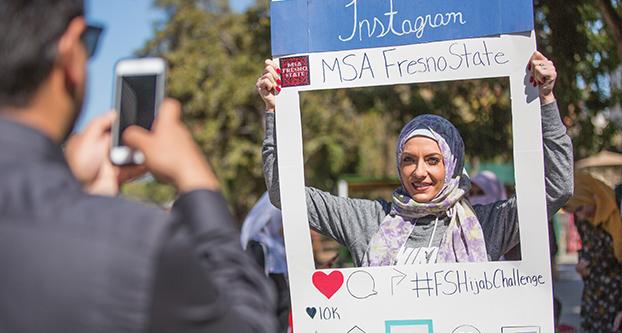The Muslim Student Association (MSA) provided free hijabs and kufi prayer caps to students in the Free Speech Area last Wednesday to issue a Fresno State Hijab Challenge.
The event was designed to educate students on the process of dressing in a hijab and provide awareness of the discrimination faced by the Islamic, Sikh and Hindu communities.
Those who participated were challenged to wear the pieces for the remainder of the day. Members of the MSA program donated hijabs of their own and assisted students as they dressed for the challenge.
“We’ve been planning this since the beginning of the year,” said MSA public relations officer Thalia Arenas. “We wanted to shine light on the other side of it, the other spectrum, the positive side where people are actually practicing what it is like to be in the day of the life of a Muslim.”
For Arenas, the event was about spreading positivity for the Muslim community, which, she said faces heavy harassment due to extremist terrorists who claim the Islamic religion.
“We want to show people that we are not affiliated whatsoever with the people who are doing those terrorist attacks,” Arenas said. “We do not believe in the things they are doing. We do not believe that they are Muslim, even though they claim to be, because we do not believe in violence. It’s all about peace for us.”
As students browsed through the hijabs laid out for them, Arenas described the dressing process and provided background on the purpose behind women wearing the hijab.
“You’re going to see that the headscarves are going to be worn in different religions, not just necessarily in Islam,” Arenas said. “Islam is the most prevalent, but you’ll also see it in the Sikh religion and the Hindu religion.”
Women can wear the hijab in a “chic style,” Arenas said, which is more loose around the face, or they can wear it tighter to the face to cover up more skin.
As for the purpose of coverage, Arenas explained that the dressing routine occurs when entering temples and churches as a sign of respect. Women are also encouraged to cover up in everyday life as well.
“It’s not compulsion. It doesn’t mean that you have to do it as a requirement,” Arenas said. “It is highly recommended if you’re going to be out and about to cover up parts that men might be enticed by because you want them to fall in love with who you are as a person and not what you look like on the outside.”
Arenas acknowledged the difference between the practices of Muslim-American women and Muslim women living in the Middle East. Restrictions are seen more frequently in the Middle East as a part of common culture, whereas Muslim-American women are granted the option of personal choice.
Faculty members offered extra-credit opportunities to students who participated in the challenge in an effort to increase involvement and awareness.
“This is a social experiment. We want people to try it, see what they feel and report back,” Arenas said. “We’re hoping that students will be more consciously aware of a person who does wear the headscarves and will not look at them negatively. Maybe by wearing it themselves they will have a better perspective.”





MP3BASE • Mar 2, 2017 at 12:03 am
Great post
Jerry3130 • Oct 11, 2016 at 12:55 pm
Will they provide free stone and educate others how to stone those who are not wearing a Hijab? Yay!
Pepe D.Plorable ✅Ꭲℛⓤℳℙð–˜ð“€ð’¾ð•¥ð–™ð‘™ð‘’ð”° • Oct 10, 2016 at 10:41 pm
Sickening. Did they have any beheading demonstrations too? What about FGM demonstrations?
Longtimereader • Oct 10, 2016 at 12:20 pm
Nothing in the Koran states that women wear the Hijab , women in Muslim countries are being beaten because they don’t want to be forced into wearing this garment it’s sad that Americans are being tricked into thinking this is something that is required by religious law and some women in America are being beaten by family members if they don’t wear It